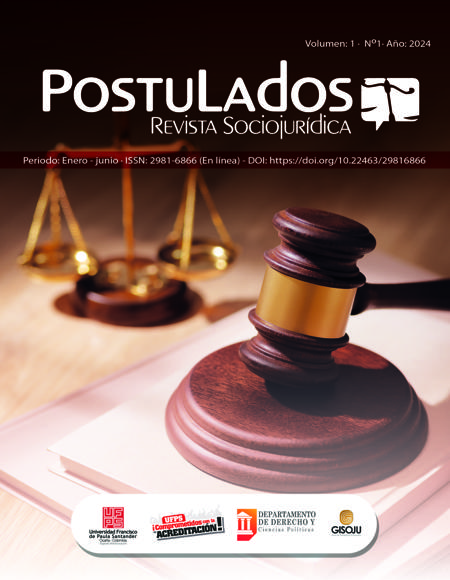¿Does the Constitucional Control by the judicial brunch over the legislative brunch is an (in)direct control over the executive brunch? An approach from Haberma´s theory
¿El Control de Constitucionalidad del Poder Judicial sobre el Poder Legislativo es un control (in)directo sobre el Poder Ejecutivo? Una aproximación desde la teoría de Habermas
Main Article Content
The article explores an unusual theme concerning the relationship between the three branches of government in the Argentine Republic. Particularly, it focuses on the checks and balances between them, and how directly and indirectly they interact when one controls the other.
The singularity of this article is that it is based on Habermas’s “Theory of Facticity and Value”. Through it, the question arose of whether when the Judicial Branch declares unconstitutional a law from the Legislative Branch, it is not also affecting the Executive Branch at the same time, taking into account that the Executive Branch could have regulated that law, thereby giving its “approval”.
Our interest is to show how declarations of unconstitutionality by the Judicial Branch not only affect the Legislative Branch, but also the Executive Branch in their parliamentarian faculties (according to theArgentine Constitution) which go from validating a law by its promulgation (generally though a regulatory decree) to the exceptional faculties to legislate that the Legislative Branch has delegated, or to the initiative to present bills to Congress that might become laws. To this purpose, we make use of the Argentine case and its presidential system.
Publication Facts
Reviewer profiles N/A
Author statements
Indexed in
- Academic society
- Universidad Francisco de Paula Santander
- Publisher
- UNIVERSIDAD FRANCISCO DE PAULA SANTANDER SECCIONAL OCAÑA
Article Details
Bidart Campos Germán (2004) Compendio de Derecho Constitucional, Buenos Aire, Ediar.
De Luca Miguel (1998) “Los Ejecutivos” dentro de H. Orlandi (compilador), Las Instituciones Políticas de Gobierno, EUDEBA, Bs. As.
(2011) “Presidentialism”, en Badie, Bertrand, Dirk Berg-Schlosser, y Leonardo Morlino (editors), International Encyclopedia of Political Science, Thousand Oaks, CA: Sage Publication.
D. Farrel Martín (2015) Carl Schmitt, Hans Kelsen y la Corte Suprema, Revista Jurídica de la Universidad de San Andrés, N°2.
García José Francisco (2003) El Control de Constitucionalidad en el federalista y los Fundamentos de una Sociedad Libre, Revista Chilena de Derecho, Vol. 30 N° 3, pp. 491-514, Sección Estudios.
Habermas Jurgen (2005) Facticidad y Validez, sobre el derecho y el estado democrático de derecho en términos de teoría del discurso, Editorial Trotta S.A. Cuarta edición.
Hamilton Alexander, Madison James y Jay John (2001) El Federalista, Fondo de Cultura Económico, México, N° 78.
Hocsman Heriberto (s/f). El Control de Constitucionalidad Argentino, Revista Doctrina. http://www.justiniano.com/revista_doctrina/control_constitucionalidad.htm
Jiménez Segado Carmelo (2013) El poder judicial y la defensa de la constitución en Carl Schmitt, Revista de Estudios Políticos (nueva época), N° 161, julio-septiembre, pp. 41-67.
Prono Santiago (2012) Los Jueces ¿frente? A la Democracia – Habermas y la justificación del control judicial de constitucionalidad. Revista de Filosofía Argumentos, Año 4, Nro. 7.
Sartori Giovanni (1994) Ingeniería Constitucional Comparada. Una Investigación de Estructuras, Incentivos y Resultados, FCE, México DF.
Schleiter Petra y Morgan-Jones Edward (2007) Semipresidencialismo: decisiones constitucionales y consecuencias políticas. Revista Debate Vol. XIV, Nro. 2, II.
Silvero Salgueiro Jorge (2006) Controles constitucionales sobre el Poder Ejecutivo. Panel del SELA “controles sobre el Ejecutivo”. Universidad de Palermo. https://www.palermo.edu/derecho/publicaciones/sela2006_pdf/Jorge_Silvero.pdf











